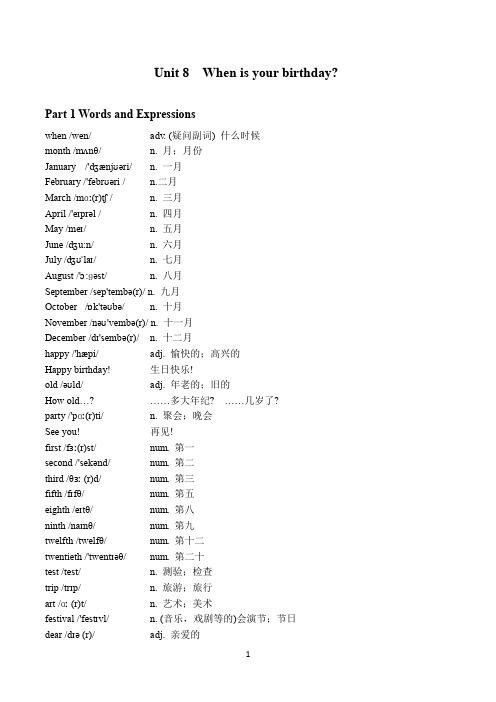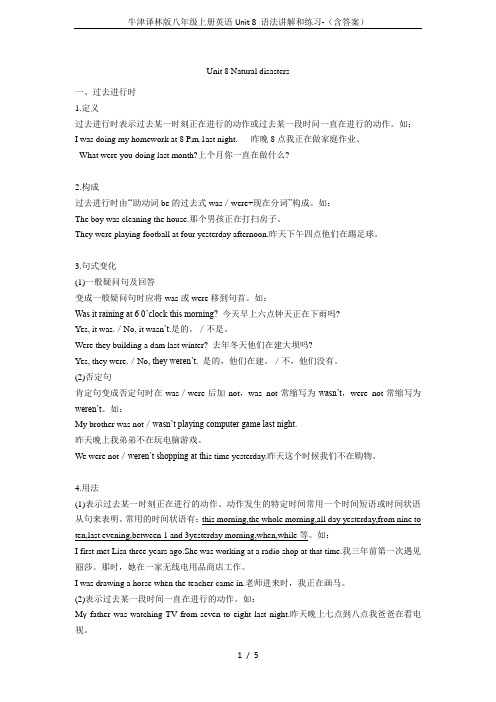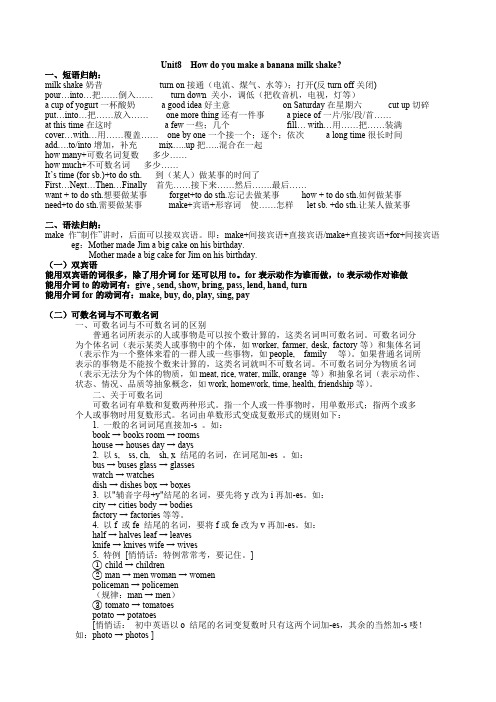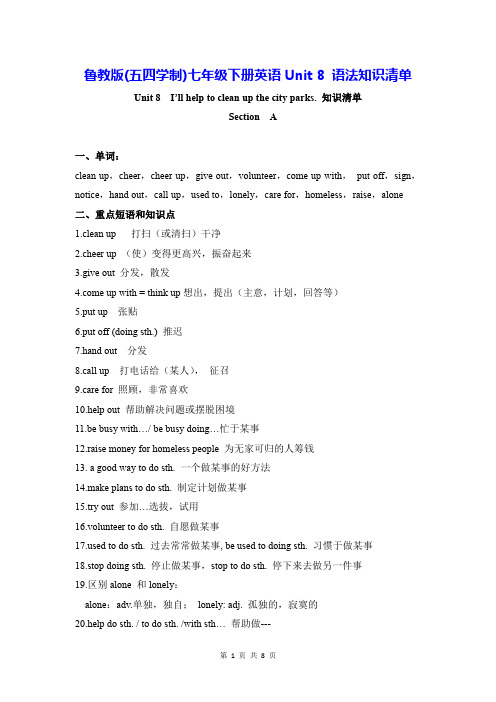Unit 8 语法
Unit 8 When is your birthday课文及语法重点

Unit 8 When is your birthday?Part 1 Words and Expressionswhen /wen/ adv. (疑问副词) 什么时候month /mʌnθ/ n. 月;月份January /'dʒænjʊəri/ n. 一月February /'febrʊəri / n.二月March /mɑː(r)tʃ / n. 三月April /'eɪprəl / n. 四月May /meɪ/ n. 五月June /dʒu:n/ n. 六月July /dʒʊˈlaɪ/ n. 七月August /'ɔ:ɡəst/ n. 八月September /sep'tembə(r)/ n. 九月October /ɒk'təʊbə/ n.十月November /nəʊ'vembə(r)/ n. 十一月December /dɪ'sembə(r)/ n. 十二月happy /'hæpi/ adj. 愉快的;高兴的Happy birthday! 生日快乐!old /əʊld/ adj. 年老的;旧的How old…?……多大年纪? ……几岁了?party /'pɑː(r)ti/ n. 聚会;晚会See you! 再见!first /fɜː(r)st/ num.第一second /'sekənd/ num.第二third /θɜː (r)d/ num.第三fifth /fɪfθ/ num.第五eighth /eɪtθ/ num.第八ninth /naɪnθ/ num.第九twelfth /twelfθ/ num.第十二twentieth /'twentɪəθ/ num.第二十test /test/ n. 测验;检查trip /trɪp/ n. 旅游;旅行art /ɑː (r)t/ n. 艺术;美术festival /'festɪvl/ n. (音乐,戏剧等的)会演节;节日dear /dɪə (r)/ adj. 亲爱的student /'stjuːdnt/ n. 学生thing/θɪŋ/n. 东西;事情term /tɜː (r)m/ n. 学期busy /'bɪzi/ adj. 忙碌的;无暇的time /taɪm/ n. 时间Have a good time! (表示祝愿) 过得愉快!there /ðeə (r)/ adv. (在)那里How old ……多大年纪?……几岁了?e.g. —How old are you?—I’m twelve years old. / I’m ___________.询问其他人的年龄时,句型为How old + ________ + 某人?e.g. How old _______ your brother?festival n. (音乐,戏剧等的)会演节;节日e.g. art festival music festivalthe Spring Festival Dragon Boat Festival春节端午节busy adj. 忙碌的;无暇的1. be busye.g. I am busy. Are you busy?2. be busy doing(v-ing) 忙着做某事e.g I am busy playing baseball.翻译:我弟弟在忙着玩他的飞机模型。
牛津译林版八年级上册英语Unit 8 语法讲解和练习-(含答案)

Unit 8 Natural disasters一、过去进行时1.定义过去进行时表示过去某一时刻正在进行的动作或过去某一段时问一直在进行的动作。
如:I was doing my homework at 8 P.m.1ast night. 昨晚8点我正在做家庭作业。
What were you doing last month?上个月你一直在做什么?2.构成过去进行时由‘‘助动词be的过去式was/were+现在分词”构成。
如:The boy was cleaning the house.那个男孩正在打扫房子。
They were playing football at four yesterday afternoon.昨天下午四点他们在踢足球。
3.句式变化(1)一般疑问句及回答变成一般疑问句时应将was或were移到句首。
如:Was it raining at 6 0’clock this morning? 今天早上六点钟天正在下雨吗?Yes, it was./No, it wasn’t.是的。
/不是。
Were they building a dam last winter? 去年冬天他们在建大坝吗?Yes, they were./No, they weren’t. 是的,他们在建。
/不,他们没有。
(2)否定句肯定句变成否定句时在was/were后加not,was not常缩写为wasn’t,were not常缩写为weren’t。
如:My brother was not/wasn’t playing computer game last night.昨天晚上我弟弟不在玩电脑游戏。
We were not/weren’t shopping at th is time yesterday.昨天这个时候我们不在购物。
4.用法(1)表示过去某一时刻正在进行的动作。
动作发生的特定时间常用一个时间短语或时间状语从句来表明。
人教版初一上册英语第八单元unit 8语法篇

Unit8语法篇序数词单项选择1. ---When is your birthday ?---It is January 23rd .A. onB. inC. atD. of2. ---May is the month of a year .A. fiveB. threeC. thirdD. fifth3. David Beckham has children . Brooklyn is his son.A. third ; firstB. three ; oneC. three ; firstD. third ; one4. Today is the boy's birthday . He is 12 years old .A. twelveB. twelvethC. twelfthD. the twelfth5. This is my day in the middle school .A. oneB. the firstC. the oneD. first6. A year has months , and December is month .A. twelve ; twelfthB. the twelve ; twelfthC. twelve ; the twelfth7. ---When is National Day in China ?---It's on .A. May 1stB. July 1stC. October 1st一、基数词变序数词1. two _______2. six_______3. eight _____4. nine______5.thirteen_______6. seventeen________7. twenty-two ________ 8. thirty_____ 9. thirty-one_______二、单词拼写(单句首字母填空)1. As we all know Thursday is the f day of a week.2. Father's Day is on the t Sunday in June.3. Tree Planting Day comes on the t of March.4. Our country developed quickly in the late t century.5. Write your name f , then you come in.三、翻译1. 第六十四中学_________________2. 三分之一____________________3 五分之四_____________________4. 第501房间__________________5. 第二层______________________6. 第三次______________________7. 他每天早上总是第一个到校。
人教版八下英语u8笔记

人教版八下英语u8笔记
以下是有关人教版八下英语u8的笔记,供您参考:
Unit 8 grammar
一、被动语态的构成:
被动语态由助动词be和及物动词的过去分词构成,其基本结构为“be+及物动词的过去分词”。
使用被动语态时需要根据时态和人称进行变化。
二、被动语态的时态:
被动语态有多种时态,包括一般现在时、一般过去时、一般将来时、现在进行时、过去进行时、现在完成时、过去完成时等。
具体形式如下:
1. 一般现在时:am/is/are+过去分词
2. 一般过去时:was/were+过去分词
3. 一般将来时:will be+过去分词
4. 现在进行时:am/is/are being+过去分词
5. 过去进行时:was/were being+过去分词
6. 现在完成时:have/has been+过去分词
7. 过去完成时:had been+过去分词
三、被动语态的用法:
被动语态常用于以下情况:
1. 不知道或不想指出动作的执行者。
2. 强调动作的承受者。
3. 在科技文献和新闻报道中,为了强调客观事实。
4. 在一些习惯用法中,如“It is said that…”(据说……)和“He will be invited to the party.”(他将受邀参加聚会。
)等。
四、主动语态与被动语态的转换:
将主动语态转换为被动语态的方法是将宾语变成主语,将谓语变成被动结构(be+过去分词),将原主语放在by后面,作为被动句中的宾语。
如果原主语不出现,被动句中常常以it作为形式主语。
Unit8_How_do_you_make_a_banana_milk_shake知识点、语法点

Unit8 How do you make a banana milk shake?一、短语归纳:milk shake奶昔turn on接通(电流、煤气、水等);打开(反turn off关闭) pour…into…把……倒入…… turn down 关小,调低(把收音机,电视,灯等)a cup of yogurt一杯酸奶 a good idea好主意on Saturday在星期六cut up切碎put…into…把……放入…… one more thing还有一件事 a piece of一片/张/段/首……at this time在这时 a few一些;几个fill… with…用……把……装满cover…with…用……覆盖…… one by one一个接一个;逐个;依次 a long time很长时间add….to/into增加,补充mix…..up把…..混合在一起how many+可数名词复数多少……how much+不可数名词多少……It’s time (for sb.)+to do sth. 到(某人)做某事的时间了First…Next…Then…Finally 首先……接下来……然后…….最后……want + to do sth.想要做某事forget+to do sth.忘记去做某事how + to do sth.如何做某事need+to do sth.需要做某事make+宾语+形容词使……怎样let sb. +do sth.让某人做某事二、语法归纳:make 作“制作”讲时,后面可以接双宾语。
即:make+间接宾语+直接宾语/make+直接宾语+for+间接宾语eg:Mother made Jim a big cake on his birthday.Mother made a big cake for Jim on his birthday.(一)双宾语能用双宾语的词很多,除了用介词for还可以用to。
人教版初一(下)英语第16讲:unit 8 语法篇 (学生版)

Unit 8 语法篇____________________________________________________________________________________________________________________________________________________________________熟练掌握本章重点语法知识。
There be 句型:1.there be 句型表示某事存在某人和某物,have、has表示拥有或是某物的一部分如:There are forty students in the classroom.I have a younger sister.2. there be 句型的一般疑问句时把be动词提前,否定句在be动词后面加not,肯定回答和否定回答是要一致。
3. there be 句型中be动词的变化是依据和它最靠近的那个名词而选择is或are,即存在就近原则。
4.there be句型中,some用于肯定句,any用于否定和疑问句,但当表示征询意见或建议时用some 而不能用any1. There is a bookstore across from the school. (改为否定句)a bookstore across from the school.2. There are some flowers on the tree. (改为一般疑问句)flowers on the tree?3. Is there a baseball under the chair? (作出肯定回答)Yes, .4. Are there any trees around your house? (作出否定回答)No, .5.我们班有60个学生.60 students in our class.基础演练一、单项选择1. --- What's in the box? It's so heavy.--- There lots of books in it.A.isB.areC.haveD.be2. There an apple and ten bananas in the basket. You can take any of them.A.areB.isC.hasD.have3. --- a small shop near your home?--- Yes,there is.A.Is itB.Is thereC.Is thatD.Is this4. --- Excuse me,is the nearest bookshop?--- Go down the street.A.howB.whatC.whereD.who5. --- Why are you standing,Alice?--- I can't see the blackboard clearly. Two tall boys are sitting me.A.behindB.next toC.betweenD.in front of巩固提高二、按要求转换句型6. There are some offices in the school building. (改为一般疑问句)offices in the school building?7. There are some trees in front of my classroom. (改为否定句)trees in front of my classroom.8. There is only one computer in the room. (对划线部分提问)there in the room?9. The basketballs are under the bed. (对划线部分提问)the basketballs?10. In front of the bank is the library,and behind the bank is the post office. (改为同义句)The bank is the library the post office.三、翻译(根据中文提示完成句子)11. 在他的课桌上有一台电脑。
鲁教版(五四学制)七年级下册英语Unit 8 语法知识清单

鲁教版(五四学制)七年级下册英语Unit 8 语法知识清单Unit 8 I’ll help to clean up the city parks. 知识清单Section A一、单词:clean up,cheer,cheer up,give out,volunteer,come up with,put off,sign,notice,hand out,call up,used to,lonely,care for,homeless,raise,alone二、重点短语和知识点1.clean up 打扫(或清扫)干净2.cheer up (使)变得更高兴,振奋起来3.give out 分发,散发e up with = think up想出,提出(主意,计划,回答等)5.put up 张贴6.put off (doing sth.) 推迟7.hand out 分发8.call up 打电话给(某人),征召9.care for 照顾,非常喜欢10.help out 帮助解决问题或摆脱困境11.be busy with…/ be busy doing…忙于某事12.raise money for homeless people 为无家可归的人筹钱13. a good way to do sth. 一个做某事的好方法14.make plans to do sth. 制定计划做某事15.try out 参加…选拔,试用16.volunteer to do sth. 自愿做某事ed to do sth. 过去常常做某事, be used to doing sth. 习惯于做某事18.stop doing sth. 停止做某事,stop to do sth. 停下来去做另一件事19.区别alone 和lonely:alone:adv.单独,独自;lonely: adj. 孤独的,寂寞的20.help do sth. / to do sth. /with sth… 帮助做---三、句子1. 你可以帮助清扫城市公园。
Unit8全面知识点总结(词汇、短语、句型、语法、习作) 2020-2021学年人教版八年级英语下册

Unit8知识点全面总结(词汇到作文)2020-2021学年人教版八年级英语下册(词汇、短语、句型、语法、习作)一.课本词汇和用法1.full of 满是...的,大量...be full of 意为“充满/装满……”。
Oliver Twist is about a boy who goes2.out to sea(1)and finds an island full of treasures.Be full of 表示状态,意为“充满...的”full是形容词。
该(2)短语相(3)当于be filled with,意为“以...填充”,是一个被动语态,fill是动词。
例如:I always believe the world is full of love.= I always believe the world is filled with love. 我总是相信世界充满了爱。
full还有“饱的。
饱满的”,其反义词为hungry 饥饿的3.treasure [ˈtreʒər] n. 财富(不可数名词);珠宝,珍藏品(可数名词)例如:They went there to look for treasure. 他们去那里寻宝。
That island is full of treasures. 那座岛上都是珠宝。
4.Island [ˈaɪlənd] n. 岛,岛屿An island 一座岛5.Classic [ˈklæsɪk] n. 经典作品;名著(可数名词)Classical adj. 经典的;古典的;传统的例如:I like classical music. 我喜欢古典音乐。
6.page [peɪdʒ] n. (书刊或纸张的)页,面,张表示多少页用“数字+page(s)”表示在第几页时用“on page +数字”(无论数字是多少,page 都用单数)例如:100 pages 100页On page 56 在第56页7.hurry [ˈhɜːri] v. 匆忙,赶快hurry up 赶快,急忙Come on!或Be quick!hurry to + 地点名词,意为“匆忙去某地”。
- 1、下载文档前请自行甄别文档内容的完整性,平台不提供额外的编辑、内容补充、找答案等附加服务。
- 2、"仅部分预览"的文档,不可在线预览部分如存在完整性等问题,可反馈申请退款(可完整预览的文档不适用该条件!)。
- 3、如文档侵犯您的权益,请联系客服反馈,我们会尽快为您处理(人工客服工作时间:9:00-18:30)。
U nit 8 时间状语从句以及used to/did not used to
语法观察室:
一、时间状语从句:
1. When I was at primary school, I took swimming lessons once a week.
I took swimming lessons once a week when I was at primary school.
2. She always sings when she is on the way home.
When she is on the way home, she always sings.
3. I will tell him everything when he comes back.
4. I am watching TV while my mum is cooking.
5. I will come to see you before I go abroad.
6. After I got home, I helped my mother do some housework.
7. I will give you a call as soon as he comes back.
8. He didn’t go to bed until his mother came back.
二、used to/did not used to
1. He used to live in Hangzhou, and now he move to Guangzhou.
2. My mum didn’t used to dance in the park, but now she goes there once a week.
3. Did you use to go to the park at the weekend?
4. We used the knife to cut the apples.
语法放大镜:
1. when从句可放在主句_______或________ , 当位于主句之前时,句中要用
________ 隔开。
2. 时间状语从句中,主句与从句的时态要________。
注意:如果主句是一般将来时,从句要用用_____________表示将来的动作或状态。
另外,连接时间状语从句的连接词还有:__________, __________, __________, _______________, ______________.
3. 从上面的例句中,我们知道used to 表示_________________,现在不做了,表达的是__________时态,后接动词的___________。
而didn’t use to 表示________________, 现在做了。
它的疑问句形式是:Did + 主语+ use to + 动词原形。
4. use something to do 意思是_________________。
注意与used to do 的区别。
语法最前线:
★一. Use the correct forms to fill in the blanks.
1. She always ______( work) hard when she was at school.
2. He likes to listen to the music when he _____ (do) his homework.
3. When I ____ (be) at the age of five, I ______ (like) playing toy cars.
4. She will come to see you as soon as she ________ (arrive)
5. The party didn’t start until Miss Chen ________ (be) there.
★二. Choose the correct answer:
( ) 1. Lucy ____ me with my English, but she doesn’t now.
A. used to helping
B. is used to help
C. used to help
D. uses to help
( ) 2. They will go to the park ____ the weather is fine.
A. after
B. when
C. before
D. what
( ) 3. What do you want to be when you ____ up?
A. will grow
B. growing
C. grew
D. grow
( ) 4. When we ____ on holidays, we ____ a lot of beautiful photos.
A. are; took
B. were; took
C. were; take
D. will be; take
( ) 5. —____ Lucy ____ to eat a lot of food?
—Yes, she did. But now she eats little to keep fit.
A. Did; use
B. Does; use
C. Did; used
D. Do; use
( ) 6. His father _________ write by hand, but now he ________ computer to write.
A. used to, used
B. is used to, used to
C. used to, uses
D. is used for, used to
★三. 句型转换。
1. I bought some red wine. I was in Italy at that time.(改为同义句)
____ I was in Italy, I ______ some red wine.
2. She often did yoga after work in the past, but she doesn’t do it now.(改为同义句)
She ____ ____ do yoga after work in the past.
3. My aunt used to make a phone call to me every weekend. (改为否定句)
My aunt ____ ____ ____ make a phone call to me every weekend.
4. Tom used to play basketball with his classmates.(改为一般疑问句)
____ Tom ____ ____ ____ basketball with his classmates?
Keys for Unit 8
语法放大镜:
1. 前面,后面,逗号
2. 一致,一般现在时,while, before, after, as soon as, until
3. 过去常常做某事,过去,原形,过去常常不做某事
4. 用……做……
语法最前线:
一.1. worked 2. does 3. was, liked 4. arrived 5. was
二.C B D B A C
三.1. When ,bought 2. used to 3. didn’t use to 4. Did, use to play。
